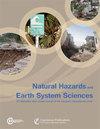The role of thermokarst evolution in debris flow initiation (Hüttekar Rock Glacier, Austrian Alps)
IF 4.7
2区 地球科学
Q1 GEOSCIENCES, MULTIDISCIPLINARY
引用次数: 0
Abstract
Abstract. A rapid sequence of cascading events involving thermokarst lake outburst, local rock glacier front failure, debris flow development, and river blockage hit Radurschl Valley (Ötztal Alps, Tyrol) on 13 August 2019. Compounding effects from permafrost degradation and drainage network development within the rock glacier initiated the complex process chain. The debris flow dammed the main river of the valley, impounding a water volume of 120 000 m3 that was partly drained by excavation to prevent a potentially catastrophic outburst flood. We present a systematic analysis of destabilizing factors to deduce the failure mechanism. The identification and evaluation of individual factors reveals a critical combination of topographical and sedimentological disposition, climate, and weather patterns driving the evolution of a thermokarst drainage network. Progressively changing groundwater flow and storage patterns within the frozen sediment accumulation governed the slope stability of the rock glacier front. Our results demonstrate the hazard potential of active rock glaciers due to their large amount of mobilizable sediment, dynamically changing internal structure, thermokarst lake development, and substantial water flow along a rapidly evolving channel network.热岩溶演化在泥石流起爆中的作用(奥地利阿尔卑斯h ttekar岩石冰川)
摘要2019年8月13日,一系列快速的级联事件袭击了Radurschl山谷(蒂罗尔州Ötztal Alps),包括热岩溶湖爆发、当地岩石冰川前缘断裂、泥石流发展和河流堵塞。岩石冰川内永久冻土退化和排水网络发展的复合效应引发了复杂的过程链。泥石流堵塞了山谷的主要河流,蓄水量达120 000 m3,通过挖掘部分排水,以防止潜在的灾难性突发洪水。我们对破坏稳定的因素进行了系统的分析,以推断其破坏机制。对单个因素的识别和评估揭示了地形和沉积学配置、气候和天气模式的关键组合,这些因素推动了热岩溶排水网络的演变。冻结沉积物堆积中地下水流动和储存模式的逐渐变化决定了岩石冰川前缘的斜坡稳定性。我们的研究结果证明了活动岩石冰川的潜在危险,因为它们有大量可移动的沉积物、动态变化的内部结构、热岩溶湖泊的发展以及沿着快速演变的渠道网络的大量水流。
本文章由计算机程序翻译,如有差异,请以英文原文为准。
求助全文
约1分钟内获得全文
求助全文
来源期刊
CiteScore
7.60
自引率
6.50%
发文量
192
审稿时长
3.8 months
期刊介绍:
Natural Hazards and Earth System Sciences (NHESS) is an interdisciplinary and international journal dedicated to the public discussion and open-access publication of high-quality studies and original research on natural hazards and their consequences. Embracing a holistic Earth system science approach, NHESS serves a wide and diverse community of research scientists, practitioners, and decision makers concerned with detection of natural hazards, monitoring and modelling, vulnerability and risk assessment, and the design and implementation of mitigation and adaptation strategies, including economical, societal, and educational aspects.

 求助内容:
求助内容: 应助结果提醒方式:
应助结果提醒方式:


